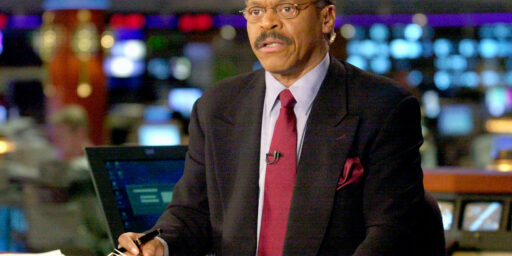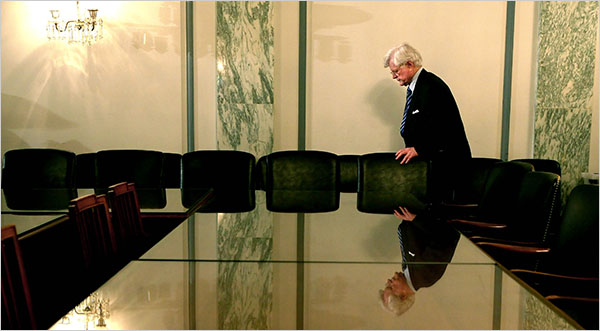Walter Cronkite Dead at 92
Walter Cronkite has passed:
Walter Cronkite, the premier TV anchorman of the networks’ golden age who reported a tumultuous time with reassuring authority and came to be called “the most trusted man in America,” died Friday. He was 92. Cronkite’s longtime chief of staff, Marlene Adler, said Cronkite died at 7:42 p.m. at his Manhattan home surrounded by family. She said the cause of death was cerebral vascular disease.
Adler said, “I have to go now” before breaking down into what sounded like a sob. She said she had no further comment.
Cronkite was the face of the “CBS Evening News” from 1962 to 1981, when stories ranged from the assassinations of President John F. Kennedy and the Rev. Martin Luther King Jr. to racial and anti-war riots, Watergate and the Iranian hostage crisis.
It was Cronkite who read the bulletins coming from Dallas when Kennedy was shot Nov. 22, 1963, interrupting a live CBS-TV broadcast of the soap opera “As the World Turns.”
Cronkite was the broadcaster to whom the title “anchorman” was first applied, and he came so identified in that role that eventually his own name became the term for the job in other languages. (Swedish anchors are known as Kronkiters; In Holland, they are Cronkiters.)
“He was a great broadcaster and a gentleman whose experience, honesty, professionalism and style defined the role of anchor and commentator,” CBS Corp. chief executive Leslie Moonves said in a statement.
CBS has scheduled a prime-time special, “That’s the Way it Was: Remembering Walter Cronkite,” for 7 p.m. Sunday.
His 1968 editorial declaring the United States was “mired in stalemate” in Vietnam was seen by some as a turning point in U.S. opinion of the war. He also helped broker the 1977 invitation that took Egyptian President Anwar Sadat to Jerusalem, the breakthrough to Egypt’s peace treaty with Israel.
He followed the 1960s space race with open fascination, anchoring marathon broadcasts of major flights from the first suborbital shot to the first moon landing, exclaiming, “Look at those pictures, wow!” as Neil Armstrong stepped on the moon’s surface in 1969. In 1998, for CNN, he went back to Cape Canaveral to cover John Glenn’s return to space after 36 years.
“It is impossible to imagine CBS News, journalism or indeed America without Walter Cronkite,” CBS News president Sean McManus said in a statement. “More than just the best and most trusted anchor in history, he guided America through our crises, tragedies and also our victories and greatest moments.”
Cronkite lived to a ripe old age and his health had been failing, so this is hardly a shock. I wasn’t old enough during Vietnam for his controversial remarks to cloud my judgment of his career, which mostly came in the last five or so years of his time as anchor and then as elder statesman.
It’s often said that there will never be another like someone who has just passed on. In Cronkite’s case, it’s not hyperbole. He was universally respected but shuffled out the door far too early, just toward the end of the period when people were simply expected to go away when the reached a certain age. At roughly the time same, David Brinkley, Harry Reasoner, and John Chancellor were moved along, too, with then-youngsters Dan Rather, Peter Jennings, and Tom Brokaw brought in to fill their chairs. All of them did so with distinction but they never occupied the same central role that the previous generation had. And none will be anywhere near as powerful as even they were. Katie Couric could well be the last anchor at CBS News; in any event, no one will much care.
And that’s the way it was, Friday, July 17, 2009.






He climbed aboard a bomber that flew over Nazi Germany. Reported on the Kennedy assassination. He saw a man land on the moon.
That’s a life. We should all have half as good a ride.
A legend in journalism.
Hope his family does OK.
It is the end of an era, and a symbolic closing of the doors on a time when very few organizations were in control of what was distributed on the public airways and in the newspapers. Often times elections could be swayed, public opinion shaped, and careers ended by information obtained from a limited number of media sources controlled by a small group of people.
These days, we have information and opinions coming at us from the left and right. A constant flow that is easily accessible 24 hours a day. On the Internet, on Cable TV, and on the cell phone while you are using the bathroom.
The era of a few controlling the information to the public is gone. The era of being bombarded constantly with information and opinion is upon us.
Which is better? Hell, I don’t know, but I kinda like the idea of access to as many sources and as much information as I can handle. A lot of people may not like it, but “that’s the way it is…these days.”
There is no disputing that Cronkite was an icon of his era, maybe even the icon of his era. Thankfully, that era is over. It was the era when the (liberal) networks enjoyed hegemony of the news. By being known as the “most trusted man in America”, he proved to be the most dangerous man alive. His opinions were often taken as gospel. Thinking in lockstep with a charismatic father figure is the first step on the road to perdition. Personally, I never trusted Cronkite as far as I could throw the Empire State building.
re: William d’Inger July 18, 2009 10:48
Would you feel the same way if Cronkite had been a conservative…
Had he been a conservative and had the network news been 100% conservative, then yes I would have felt the same. People readily recognize the dangers of monopoly power when it’s related to business practices, but they (usually) fail to consider the dangers of monopolies in other areas of life. I inherently distrust all monopolies, e.g., labor unions, etc.
(Shake of the head)
‘Nuff said.
Let’s be careful about lionizing this guy, folks.
Eric:
I agree. Cronkite thought Karl Rove was a very clever guy? That is nuts. Karl Rove burned down the Republican party and ensured that his patron would go down in history as a divisive partisan hack.
Oh, wait, I see: you mean the timing of the particular Bin Laden tape they were referencing. Yeah, because it’s not like the Bush White House would ever manipulate intelligence for the sake of its own agenda.
Rove is clever but to suggest Rove had influence in what OBL did or didn’t do is nucking futz.
On both his part and yours.
Eric:
Except that’s not what either I or Cronkite suggested. He suggested the timing of the tape’s release might have been manipulated. Which does not require Osama’s cooperation, merely the cooperation of whoever had possession of the tape.
The thing about Cronkite being a big old liberal is this: in the time that he came of age, from his birth to his establishment in a career (say, 1916-1946), pretty much everything great that occurred in America was due to the government, which is to say, the will of the people acting through its elected representatives.
We were decisive in ending WW1, and the only slim hope of avoiding another one would have been if the Allies had listened to Wilson’s great ambassador Herbert Hoover, and not insisted on a humiliating and backbreaking peace.
Nothing great happened in the 1920s except Louis Armstrong and Babe Ruth. After that, we came through the Depression without succumbing to communism or fascism. And most importantly, we saved the world in WW2.
In other periods (like the Gilded Age or our own), government isn’t as much the engine of whatever national greatness we can claim. But in Cronkite’s day, they were really the only game in town.
Cronkite’s post retirement admission that he intentionally propagandized the Vietnam War by showing night after night of mayhem of course cuts the heart out of his journalistic purity. His successors took it to high art.
That said, one can’t ignore (and must admire) his disdain for how news rooms migrated from reasonable attempts at “news” to info-tainment. Its a shame his bias did not enable him to see how he participated in setting the whole news as entertainment and advocacy in motion.
So then those images weren’t legitimate news? They should have been kept from the eyes of the American people? Quite a bit of a stretch from that to “info-tainment”…
It’s what he SAID. Don’t blame me if I take the meanings of his words, not the meanings of your kinder re-write of his words. Further, was that the only example, I’d be far less inclined to accept it as exemplary of the man’s overall leanings. We both know better. (Drew makes that point well, for example in his first para)
Cronkite said we lost Tet. That was a lie. The kill ratio was something like 98 to 1. The VC were all but wiped out. We faced NVN regulars almost exclusively after Tet. I believe Giap stated in memoirs the North was ready to throw in the towel, but seeing how the world reacted after Walter Cronkite’s declaration the U.S. has lost, they decided to hold on. That lie by Walter cost tens of thousands of Americans their lives. If that is your kind of hero, you can have him.
Ragshaft, least you revise an historical moment…
President Johnson, was very demoralized and disillusioned and finally after excruciating soul searching and at long last… was completely fed up with “Westy’s†inflated “body counts†of “VC combatants†and appointed General Creighton W. Abrams as his replacement.
Upon his return to the US, President Johnson promoted General Westmorland to Chief of Staff of the US Army.
The rest is history…!
Hey Ragsey…
Question…?
Is that implicit or…
Explicit…?
Mon apologies, Ragsey…
My questions should have been…
Is that implied conjecture on your part or explicitly; an After Action Report [AAR] you actually wrote…as a combatant…?
Sorta like Bush giving Tenant “The Medal of Freedom†for exclaiming with emphasis; that the presence of WMD in Iraq was…